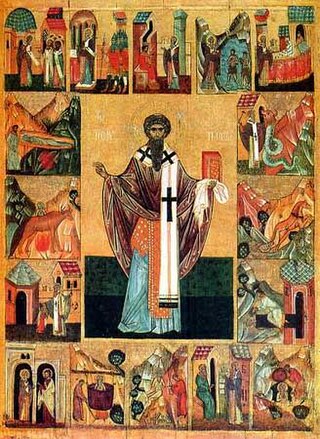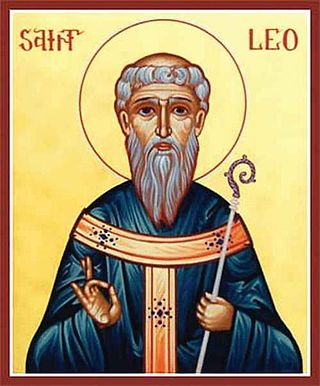
Pope Agatho served as the bishop of Rome from 27 June 678 until his death. He heard the appeal of Wilfrid of York, who had been displaced from his see by the division of the archdiocese ordered by Theodore of Canterbury. During Agatho's tenure, the Sixth Ecumenical Council was convened to deal with monothelitism. He is venerated as a saint by both the Catholic and Eastern Orthodox churches.

Gregory Thaumaturgus or Gregory the Miracle-Worker, also known as Gregory of Neocaesarea, was a Christian bishop of the 3rd century. He has been canonized as a saint in the Catholic and Orthodox Churches.

Sep. 2 - Eastern Orthodox liturgical calendar - Sep. 4

March 30 - Eastern Orthodox liturgical calendar - April 1

May 15 - Eastern Orthodox Church calendar - May 17

May 20 - Eastern Orthodox Church calendar - May 22

May 22 - Eastern Orthodox Church calendar - May 24
Equal-to-apostles or equal-to-the-apostles is a special title given to some saints in Eastern Orthodoxy and in Byzantine Catholicism. The title is bestowed as a recognition of these saints' outstanding service in the spreading and assertion of Christianity, comparable to that of the original apostles.

John of Shanghai and San Francisco was a prominent Eastern Orthodox ascetic and hierarch of the Russian Orthodox Church Outside Russia (ROCOR) who was active in the mid-20th century. He was a pastor and spiritual father of high reputation and a reputed wonderworker to whom were attributed powers of prophecy, clairvoyance and healing. He is often referred to as "St. John the Wonderworker".

August 6 - Eastern Orthodox liturgical calendar - August 8

November 20 - Eastern Orthodox liturgical calendar - November 22

February 19 - Eastern Orthodox liturgical calendar - February 21
Saint Gregory, also Pope Gregory I or Gregory the Dialogist, was Pope from 590 until his death.
The history of the Eastern Orthodox Church is the formation, events, and transformation of the Eastern Orthodox Church through time. According to the Eastern Orthodox tradition, the history of the Eastern Orthodox Church is traced back to Jesus Christ and the Apostles. The Apostles appointed successors, known as bishops, and they in turn appointed other bishops in a process known as Apostolic succession. Over time, five Patriarchates were established to organize the Christian world, and four of these ancient patriarchates remain Orthodox today. Orthodox Christianity reached its present form in late antiquity, when the ecumenical councils were held, doctrinal disputes were resolved, the Fathers of the Church lived and wrote, and Orthodox worship practices settled into their permanent form.

John of Moscow also known as Blessed John the Fool for Christ was a 16th-century Russian saint. He was born on the outskirts of Vologda in Russia. He was considered a wonderworker in Moscow and spent his youth as a labourer in a local saltworks and as a water-carrier. John made his work a spiritual discipline in conjunction with a strict commitment to fasting and personal prayer.

Hypatius of Gangra was Titular Bishop of Gangra, Asia Minor. He was present at the First Ecumenical Council where he supported Saint Athanasius the Great against the Arian heresy. The Eastern Orthodox Church celebrates him on March 31 and Roman Catholic Church celebrates him on 14 November.

Saint Leo of Catania, also known as the Thaumaturgus, or St Leo the Wonderworker in Sicily, was the fifteenth bishop of Catania, famed also for his love and care toward the poor. His feast day occurs on 20 February, the day of his death, when he is venerated as a saint by both Roman Catholics and the Orthodox Church. He lived in the hiatus between the reigns of the Emperors Justinian II and Constantine VI.

November 15 - Eastern Orthodox liturgical calendar - November 17

December 3 - Eastern Orthodox liturgical calendar - December 5